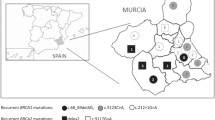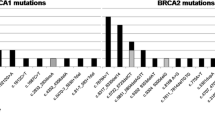Abstract
We screened BRCA1 and BRCA2 germline mutations in 60 high-risk breast and/or ovarian cancer patients and 20 relatives from Aragon (Spain) by DHPLC (Denaturing High Performance Liquid Chromatography) and direct sequencing of the entire coding sequence and the splicing sites of both genes. We have identified 17 different pathogenic mutations: 8 in BRCA1 and 9 in BRCA2 in 60 unrelated patients and 50% of relatives were carriers. The prevalence of pathogenic mutations in this study was 33.33%. Two truncating mutations are novel: c.5024_5025delGA in exon 16 of BRCA1 and c.2929delC in exon 11 of BRCA2 (numbered after GenBank U14680 and U43746). Multiplex Ligation Dependent Probe Amplification (MLPA) was performed for large mutational scanning of both genes and a large genomic deletion in BRCA1 was found (DelEx8-13). Furthermore, five mutations are described for the first time in Spanish population: c.1191delC, c.3478_3479delTT and c.6633_6637delCTTAA (BRCA1) and c.3972_3975delTGAG and 3908_3909delTG (BRCA2). Three mutations have been reported previously once in Spain: c.3600_3610del11 (BRCA1), c.5804_5807delTTAA (BRCA2) and c.9246C>A (BRCA2). The mutation c.5374_5377delTATG has been found before only in two unrelated families from Castilla-Leon, Spain (BRCA2). Frequent mutations described in Spanish population have also been present: c.187_188delAG, c.5242C>A and c.5385insC in BRCA1 and c.3492_3493insT and c.9254_9258delATCAT in BRCA2. c.5242C>A, 3972_3975delTGAG and c.5804_5807delTTAA were the recurrent mutations found. Fifteen different unclassified variants were identified (25% families). Although specific BRCA1 and BRCA2 mutations are recurrently reported as a result of genetic founder effects we conclude that heterogeneous ethnicity increases the variety of mutations that can be found in Spanish populations.

Similar content being viewed by others
References
Martinez-Ferrandis JI, Vega A, Chirivella I, Marín-García P, Insa A, Lluch A, Carracedo A, Chaves FJ, García-Conde J, Cervantes A, Armengod ME (2003) Mutational analysis of BRCA1 and BRCA2 in Mediterranean Spanish women with early-onset breast cancer: identification of three novel pathogenic mutations. Hum Mutat 22:417–418
Woodward AM, Davis TA, Silva AGS, kConFab Investigators, Kirk JA, Leary JA (2005) Large genomic rearrangements of both BRCA2 and BRCA1 are a feature of the inherited breast/ovarian cancer phenotype in selected families. J Med Genet 42(5):e31
Diez O, Cortes J, Domenech M, Brunet J, Del Río E, Pericay C, Sanz J, Alonso C, Baiget M (1999) BRCA1 mutation analysis in 83 Spanish breast and breast/ovarian cancer families. Int J Cancer 83(4):465–469
Diez O, Cortes J, Domenech M, Pericay C, Brunet J, Alonso C, Baiget M (2000) BRCA2 germ-line mutations in Spanish male breast cancer patients. Ann Oncol 11:81–84
Neuhausen SL, Godwin AK, Gershoni-Baruch R, Schubert E, Garber J, Stoppa-Lyonnet D, Olah E, Csokay B, Serova O, Lalloo F, Osorio A, Stratton M, Offit K, Boyd J, Caligo MA, Scott RJ, Schofield A (1998) Haplotype and phenotype analysis of nine recurrent BRCA2 mutations in 111 families: results of an international study. Am J Hum Genet 62:1381–1388
Osorio A, Robledo M, San Roman JM, Albertos J, Andrade J, Barabash A, Benitez J (1997) Mutation analysis of the BRCA2 gene in breast/ovarian cancer Spanish families: identification of two new mutations. Cancer Lett 121:115–118
Osorio A, Robledo M, Albertos J, Diez O, Alonso C, Baiget M, Benitez J (1998) Molecular analysis of the six most recurrent mutations in the BRCA1 gene in 87 Spanish breast/ovarian cancer families. Cancer Lett 123:153–158
De la Hoya M, Gutierrez-Enríquez S, Velasco E, Osorio A, de Abajo AS, Vega A, Salazar R, Esteban E, Llort G, González-Sarmiento R, Cariacedo A, Benítez J, Miner C, Diez O, Diaz-Rubio E, Caldes T (2006) Genomic rearrangements at the BRCA1 locus in Spanish families with breast/ovarian cancer. Clin Chem 52(8):1480–1485
Duran M, Esteban-Cardeñosa E, Velasco E, Infante M, Miner C (2003) Mutational analysis of BRCA2 in Spanish breast cancer patients from Castilla-Leon: identification of four novel truncating mutations. Hum Mutat 21:448
Llort G, Yagüe-Muñoz C, Peris-Tuser M, Blanco-Guillermo I, Germá-Lluch JR, Bale AE, Alvarez-Franco M (2002) Low frequency of recurrent BRCA1 and BRCA2 mutations in Spain. Hum Mutat: Mutation in Brief #485
De la Hoya M, Osorio A, Godino J, Sulleiro S, Tosar A, Pérez-Segura P, Fernández C, Rodríguez R, Díaz Rubio E, Benítez J, Devilee P, Caldés T (2002) Association between BRCA1 and BRCA2 mutations and cancer phenotype in Spanish breast/ovarian cancer families: implications for genetic testing. Int J Cancer 97(4):466–471
Bolufer P, Munárriz B, Santaballa A, Velasco E, Lerma E, Barragán E (2005) BRCA1 and BRCA2 mutations in patients with familial breast cancer. Med Clin (Barc) 124(1):10–12
Infante M, Durán M, Esteban-Cardeñosa E, Miner C, Velasco E (2006) High proportion of novel mutations of BRCA1 and BRCA2 in breast/ovarian cancer patients from Castilla-León (central Spain). J Hum Genet 51:611–617
Diez O, Osorio A, Duran M, Martínez-Ferrandis JI, de la Hoya M, Salazar R, Vega A, Campos B, Rodríguez-López R, Velasco E, Chaves J, Diaz-Rubio E, Jesús Cruz J, Torres M, Esteban E, Cervantes A, Alonso C, San Roman JM, González-Sarmiento R, Miner C, Carracedo A, Eugenia Armengod M, Caldés T, Benítez J, Baiget M (2003) Analysis of BRCA1 and BRCA2 genes in Spanish breast/ovarian cancer patients: a high proportion of mutations unique to Spain and evidence of founder effects. Hum Mutat 22:301–312
Miki Y, Swensen J, Shattuck-Eidens D, Futreal PA, Harshman K, Tavtigian K, Liu Q, Cochran C, Bennett LM, Ding W, Bell R, Rosenthal J, Hussey C, Tran T, McClure M, Frye C, Hattier T, Phelps R, Haugen-Strano A, Katcher H, Yakumo K, Gholami Z, Shaffer D, Stone S, Bayer S, Wray C, Bogden R, Dayananth P, Ward J, Tonin P, Narod S, Bristow PK, Norris FH, Helvering L, Morrison P, Rosteck P, Lai M, Barrett JC, Lewis C, Neuhausen S, Cannon-Albright L, Goldgar D, Wiseman R, Kamb A, Skolnick MH (1994) A strong candidate for the breast and ovarian cancer susceptibility gene BRCA1. Science 266:66–71
Osorio A, Barroso A, Martinez B, Cebrian A, San Roman JM, Lobo F, Robledo M, Benitez J (2000) Molecular analysis of the BRCA1 and BRCA2 genes in 32 breast and/or ovarian cancer Spanish families. Br J Cancer 82:1266–1270
Vega A, Campos B, Bressac-de-Paillerets B, Bond PM, Janin N, Douglas FS, Domenech M, Baena M, Pericay C, Alonso C, Carracedo A, Baiget M, Diez O (2001) The R71G BRCA1 is a founder Spanish mutation and leads to aberrant splicing of the transcript. Hum Mutat 17:520–521
Sociedad Española de Oncología Médica (SEOM) (2004) Documento de Consenso sobre cáncer de mama hereditario
Simard J, Tonin P, Durocher F, Morgan K, Rommens J, Gingras S, Samson C, Leblanc JF, Bélanger C, Dion F, Liu Q, Skolnick M, Goldgar D, Shattuck-Eidens D, Labrie F, Narod SA (1994) Common origins of BRCA1 mutations in Canadian breast and ovarian cancer families. Nat Genet 8(4):392–398
Taylor CF, Charlton RS, Burn J, Sheridan E, Taylor GR (2003) Genomic deletions in MSH2 or MLH1 are a frequent cause of hereditary non-polyposis colorectal cancer: identification of novel and recurrent deletions by MLPA. Hum Mutat 22(6):428–433
Dunnen JT, Antonorakis SE (2000) Mutation nomenclature extensions and suggestions to describe complex mutations: a discussion. Hum Mutat 15:7–12
Gad S, Caux-Moncoutier V, Pages-Berhouet S, Gauthier-Villars M, Coupier I, Pujol P, Frenay M, Gilbert B, Maugard C, Bignon YJ, Chevrier A, Rossi A, Fricker JP, Nguyen TD, Demange L, Aurias A, Bensimon A, Stoppa-Lyonnet D (2002) Significant contribution of large BRCA1 gene rearrangements in 120 French breast and ovarian cancer families. Oncogene 21(44):6841–6847
Hartmann C, John AL, Klaes R, Hofmann W, Bielen R, Koehler R, Janssen B, Bartram CR, Arnold N, Zschocke J (2004) Large BRCA1 gene deletions are found in 3% of German high-risk breast cancer families. Human Mutat: Mutation in Brief#762
Augello C, Bruno L, Bazan V, Calo V, Agnese V, Corsales S, Cascio S, Gargano G, Terrasi M, Barbera F, Fricano S, Adamo B, Valerio MR, Colucci G, Sumarz E, Russo A (2006) Y179C, F486L and N550H are BRCA1 variants that may be associated with breast cancer in a Sicilian family: results of a 5-year GOIM (Gruppo Oncologico dell´Italia Meridionale) prospective study. Ann Oncol 17(Suppl. 7):VII30–VII33
Diez O, Osorio A, Robledo M, Barroso A, Domenech M, Cortes J, Albertos J, Sanz J, Brunet J, SanRoman JM, Alonso MC, Baiget M, Benitez J (1999) Prevalence of BRCA1 and BRCA2 Jewish mutations in Spanish breast cancer patients. Br J Cancer 79:1302–1303
Szabo CI, King MC (1997) Population genetics of BRCA1 and BRCA2. Am J Hum Genet 60:1013–1020
Wooster R, Bignell G, Lancaster J, Swift S, Seal S, Mangion J, Collins N, Gregory S, Gumbs C, Micklem G, Barfoot R, Hamoudi R, Patel S, Rice C, Biggs P, Hashim Y, Smith A, Connor F, Arason A, Gudmundsson J, Ficenec D, Kelsell D, Ford D, Tonin P, Bishop DT, Spurr NK, Ponder BAJ, Eeles R, Peto J, Devilee P, Cornelisse C, Lynch H, Narod S, Lenoir G, Egilsson V, Barkadottir RB, Easton DF, Bentley DR, Futreal PA, Ashworth A, Stratton MR (1995) Identification of the breast cancer susceptibility gene BRCA2. Nature 378(6559):789–792
Acknowledgments
We thank the Miguel Servet Foundation for its support. We are also grateful to the patients, the clinicians and all the staff especially of the Clinical Biochemistry, Oncology and Ginecology Services (Hospital Universitario Miguel Servet, Zaragoza). We also thank to the Department of Ginecology, Hospital Clínico Universitario Lozano Blesa, Zaragoza.
Author information
Authors and Affiliations
Corresponding author
Rights and permissions
About this article
Cite this article
Miramar, M.D., Calvo, M.T., Rodriguez, A. et al. Genetic analysis of BRCA1 and BRCA2 in breast/ovarian cancer families from Aragon (Spain): two novel truncating mutations and a large genomic deletion in BRCA1. Breast Cancer Res Treat 112, 353–358 (2008). https://doi.org/10.1007/s10549-007-9868-1
Received:
Accepted:
Published:
Issue Date:
DOI: https://doi.org/10.1007/s10549-007-9868-1




